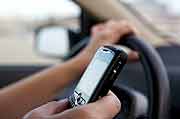
MONDAY, May 13 (HealthDay News) — Close to half of U.S high school students text while driving, a habit that dramatically increases their risk of getting into a potentially fatal car crash, a new study shows.
Teens who reported texting while driving were more likely to engage in other risky driving behaviors such as driving under the influence of alcohol or not wearing a seat belt, the study also found.
The research was published online May 13 and in the June print issue of the journal Pediatrics.
Researchers used responses from more than 8,500 high school students 16 and older who were asked if they had texted while driving during the past month, as part of a 2011 national survey on risky youth behavior. Overall, 44.5 percent of teens said they had done so on one or more days. One in four texted while driving on a daily basis, the study showed. The older the students, the more likely they were to text and drive. Male high school students texted while driving more often than female students.
“The numbers are fairly concerning,” said study author Emily O’Malley Olsen, a health statistician in the department of adolescent and school health at the U.S. Centers for Disease Control and Prevention. “It just takes a second of looking away from the road to get into trouble.”
Some of the onus falls on parents and pediatricians to counsel teens on the dangers of texting while behind the wheel, she suggested.
“Teens are pretty new drivers and less able to recognize hazardous driving situations and they tend to perceive risk a little bit differently than adults,” Olsen said. “Parents should monitor their kids and have frequent discussions about things that can come up while driving such as texting, playing with the radio or playing around with their buddies.”
Other experts stressed the importance of making sure teens get the message that texting while driving can have deadly consequences.
“It may not seem as bad as driving while using alcohol or drugs, but texting while driving can be very detrimental to a person’s health — killing them or causing severe injuries,” said Dr. Metee Comkornruecha, an adolescent medicine specialist at Miami Children’s Hospital.
He said he plans to continue to bring up the dangers associated with texting behind the wheel with his teen patients, especially since this behavior is linked to other risky behaviors while driving. “Motor vehicle crashes are the number one cause of death in teens,” he said.
Dr. Lee Beers, a pediatrician at Children’s National Medical Center, in Washington, D.C., said the findings are not surprising, but agreed that they are very concerning. “The association of texting while driving with other risk behaviors tells us that we probably need to approach this more globally,” she said.
Getting through to teens who often feel like they are invincible can be challenging. “The most effective way is to make it real and immediate to teens is by citing an example of someone in the community or school who died or was seriously injured as a result of texting while driving,” Beers said.
More information
Learn more about how to encourage safe teen driving at the U.S. Centers for Disease Control and Prevention.

